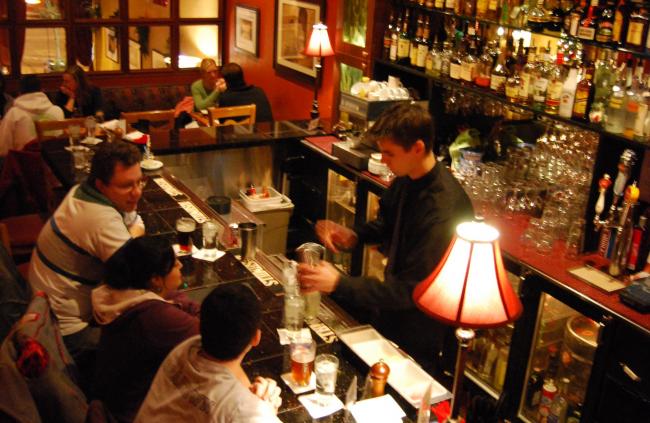City's 'meathead ordinance' targets late-night misbehavior
A new city ordinance passed Aug. 3 targets disruptive and dangerous behavior after patrons leave bars and clubs.
Fri, 08/06/2010
"Ballard on the weekend has become sort of its own animal," Ryan Ellis said. "That's not a bad thing. But, there is an increase of the 'meathead' element."
Ryan, who is the general manager of the Tractor Tavern, tends bar at the Sunset Tavern and has worked at Zayda Buddy's, Conor Byrne and Hazlewood, compares the late-night weekend scene to the parking lot of a sports stadium on game day.
The Seattle City Council is hoping to enable the Seattle Police Department to better curb that disruptive element with what they are calling the "Meathead Ordinance," passed unanimously Aug. 3.
Sponsored by Councilmember Nick Licata, the Meathead Ordinance allows police officers to give tickets for fighting, making threats or creating unreasonable noise between midnight and 5 a.m. in pubic areas of commercial districts.
“A large number of the problems police have to deal with in nighlife dsitricts are connected to closing time and a surge of bar patrons coming onto the street together," Licata said in his newsletter, "Urban Politics." "The new law should address 80 to 90 percent of the behavioral problems police encounter when crowds leave the bars.”
Licata said the ordinance provides police officers with a preventative tool to address unruly bar patrons on the sidewalk and will result in quieter nights and safer streets.
The Ballard nightlife scene is great, but there is a part of it that threatens to become a problem, not only for people living and working in the neighborhood, but also for those people who want to enjoy the nightlife in a responsible way, Ellis said.
He said the best part of the ordinance is that it puts the responsibility for bad behavior on the individual instead of on the bar or club.
The Meathead Ordinance defines a public place as one that is "an area generally visible to public view and includes alleys, bridges, buildings, driveways, parking lots, parks, plazas, sidewalks and streets open to the general public and the doorways and entrances to buildings or dwellings and the grounds enclosing them."
That definition does not include sidewalk cafes or other private outdoor seating areas.
To threaten someone, according to the ordinance, is to "verbally communicate the intent to assault, fight or cause bodily injury to the person threatened or to any other person."
Unreasonable noise is defined by the ordinance as "loud and raucous, and
frequent, repetitive or continuous sounds that are audible to a person of normal hearing at a distance of 75 feet or more from the source of the noise."
Violation of the ordinance will result in a minimum fine of $50. The ordinance will go into effect after a Washington State Department of Ecology review, legally required for laws involving noise, which could take up to 90 days.
Though there is a need for more police presence in the downtown Ballard areas, there is also a need for more self-control, which many people seem to lack, especially after consuming alcohol, Ellis said.
"If people can't behave themselves, then yes, we need the city to step in," he said. "What I do know abut the ordinance seems like it could be a way to address the issues before they become a problem."
Susan Ward, a partner at The BalMar, said she does not think the ordinance will have a big impact on Ballard, as the neighborhood does not have the same level of problems as Belltown or other commercial districts, but she still supports the ordinance.
"As a business owner, I want to be a good neighbor," Ward said. "If this helps police keep things civil on the streets, we're supportive of that."
She said people might think twice before getting rowdy simply by knowing the ordinance exists.


